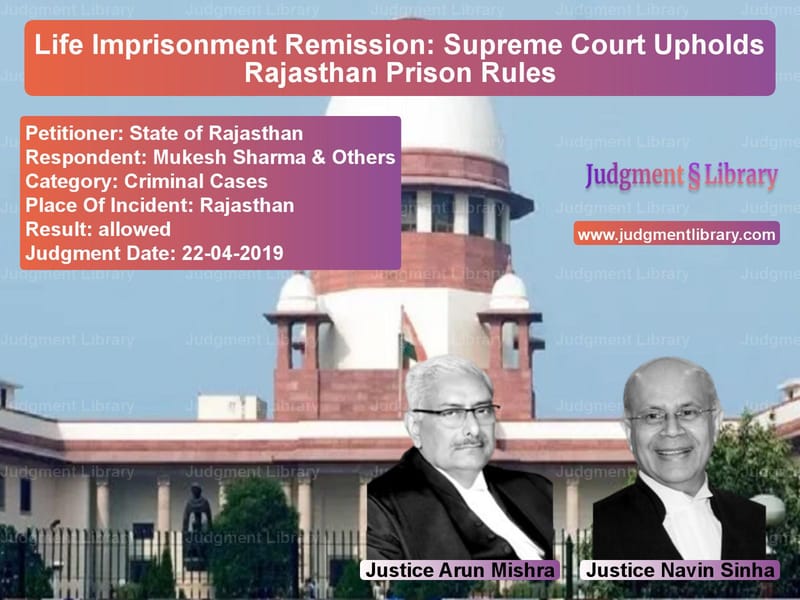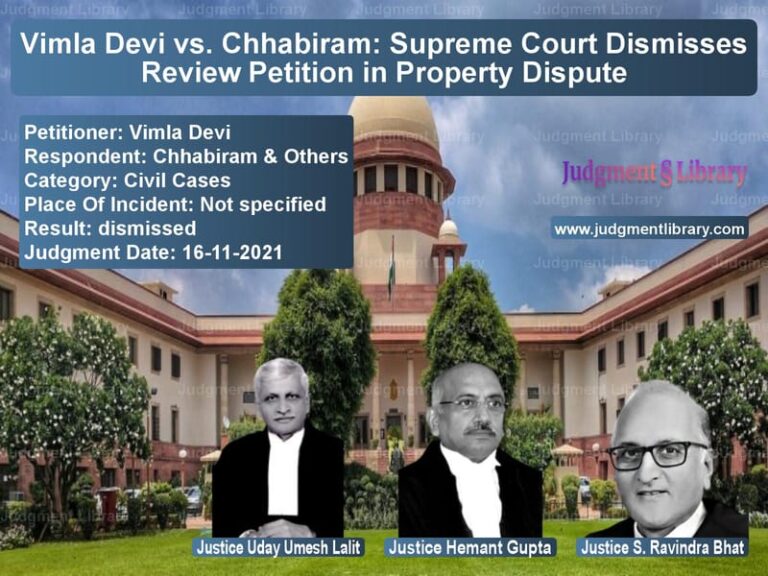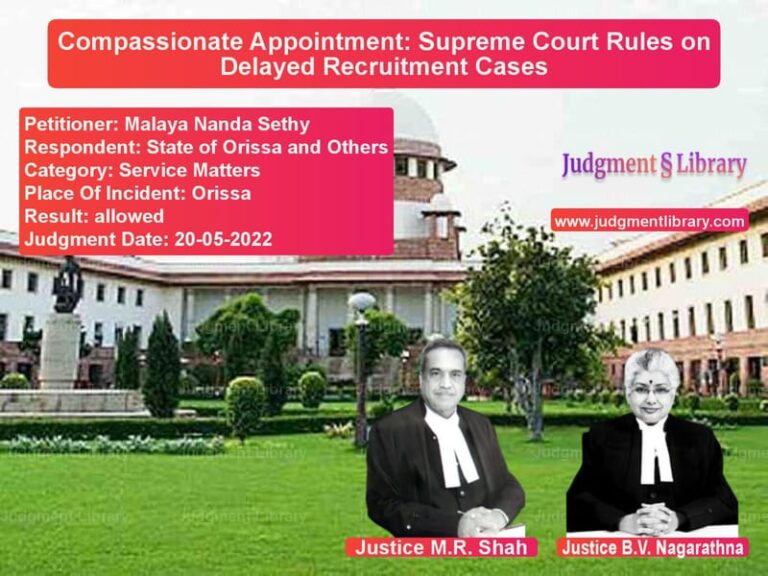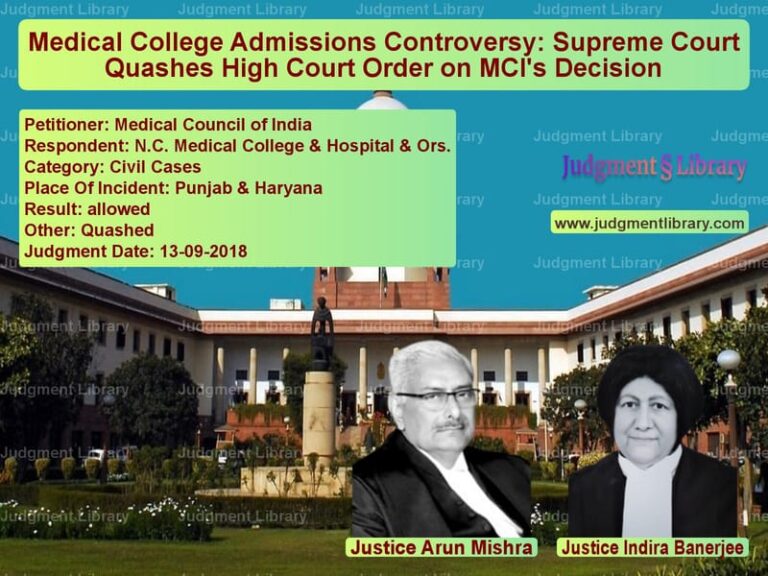Life Imprisonment Remission: Supreme Court Upholds Rajasthan Prison Rules
The Supreme Court of India has ruled in favor of the State of Rajasthan, upholding the validity of Rule 8(2)(i) of the Rajasthan Prisons (Shortening of Sentences) Rules, 2006, which mandates that prisoners serving life sentences for offenses where the death penalty is an option must serve at least 14 years of actual imprisonment and earn a minimum of four years of remission before their cases can be considered for premature release.
Background of the Case
The case involved multiple appellants, all of whom were convicted under Section 302 of the Indian Penal Code (IPC) for separate, unconnected incidents and sentenced to life imprisonment. They had served more than 14 years in custody and filed individual writ petitions, arguing that their cases were not placed before the State Advisory Boards for consideration of their premature release. They challenged the constitutional validity of Rule 8(2)(i) of the Rajasthan Prisons (Shortening of Sentences) Rules, 2006, which requires them to earn a minimum of four years of remission in addition to serving 14 years of actual imprisonment.
The Rajasthan High Court had struck down this rule on two grounds: first, that the rules had not been placed before the State Legislature as required by Section 59(2) of the Prisons Act, 1894, and second, that the rule was inconsistent with Section 433-A of the Code of Criminal Procedure (Cr.P.C.), which mandates a minimum of 14 years of imprisonment before remission is considered.
The State of Rajasthan appealed against the High Court’s decision before the Supreme Court.
Legal Issues Before the Supreme Court
- Whether the Rajasthan Prisons (Shortening of Sentences) Rules, 2006, were invalid due to not being laid before the State Legislature.
- Whether Rule 8(2)(i) contradicted Section 433-A of the Cr.P.C.
- Whether prisoners serving life sentences have a fundamental right to remission.
- Whether the requirement to earn four years of remission before eligibility for release consideration was lawful.
Arguments Before the Supreme Court
Appellant’s (State of Rajasthan) Contentions:
- The State argued that the requirement under Section 59(2) of the Prisons Act to lay the rules before the Legislature was directory, not mandatory, and non-compliance did not invalidate the rules.
- They contended that the Rajasthan Prisons (Shortening of Sentences) Rules, 2006, were framed in accordance with statutory powers and did not conflict with Section 433-A of the Cr.P.C.
- The government maintained that remission is not a right but a privilege subject to conditions determined by the State.
- They cited Maru Ram v. Union of India and Mohd. Munna v. Union of India to support the argument that the power to grant remission lies with the State, and it may impose conditions on how remission is earned.
Respondents’ (Convicted Prisoners) Counterarguments:
- The respondents contended that the rules were invalid since they had not been laid before the Legislature, violating Section 59(2) of the Prisons Act.
- They argued that the requirement to earn four years of remission in addition to 14 years of imprisonment was arbitrary and violated Article 14 of the Constitution.
- The prisoners claimed that the rule effectively extended their sentence beyond what was required under Section 433-A of the Cr.P.C.
- They cited the Constitution Bench ruling in Maru Ram v. Union of India, which held that while the State can regulate remission, it cannot impose conditions that conflict with Section 433-A.
Supreme Court’s Observations
The Supreme Court rejected the respondents’ claims and upheld the Rajasthan Prisons (Shortening of Sentences) Rules, 2006, making the following key observations:
- “The requirement under Section 59(2) of the Prisons Act to lay the rules before the Legislature is directory, not mandatory. Failure to comply does not render the rules invalid.”
- “Rule 8(2)(i) does not contradict Section 433-A of the Cr.P.C. but rather supplements it by setting additional eligibility criteria for consideration of remission.”
- “Remission is a matter of State policy and is not a fundamental right. The State can impose reasonable conditions for earning remission.”
- “The requirement to earn four years of remission does not violate Article 14 of the Constitution, as it applies uniformly to all life convicts sentenced for offenses punishable by death.”
The Court reiterated that life imprisonment means imprisonment for the convict’s natural life unless it is remitted, commuted, or reduced. Referring to Gopal Vinayak Godse v. State of Maharashtra, the Court emphasized that life imprisonment does not automatically mean 20 years, and remission is subject to the State’s discretion.
Final Judgment
The Supreme Court set aside the Rajasthan High Court’s ruling and upheld the validity of Rule 8(2)(i) of the Rajasthan Prisons (Shortening of Sentences) Rules, 2006. The key directives of the judgment were:
- The requirement that life convicts serve 14 years of actual imprisonment and earn four years of remission before consideration for premature release is legally valid.
- The Rajasthan Prisons (Shortening of Sentences) Rules, 2006, remain in force and are consistent with Section 433-A of the Cr.P.C.
- The ruling does not grant a fundamental right to remission but clarifies that remission policies must be uniformly applied.
- The appeals filed by the State of Rajasthan were allowed, and the High Court’s ruling was overturned.
Conclusion
This ruling provides clarity on the State’s power to regulate remission policies and affirms that prisoners do not have an automatic right to early release. The judgment reinforces that life imprisonment means imprisonment for the convict’s entire life unless remission is granted. By upholding Rule 8(2)(i), the Supreme Court ensures that remission remains a privilege granted based on a prisoner’s conduct and other conditions set by the State.
Petitioner Name: State of Rajasthan.Respondent Name: Mukesh Sharma & Others.Judgment By: Justice Arun Mishra, Justice Navin Sinha.Place Of Incident: Rajasthan.Judgment Date: 22-04-2019.
Don’t miss out on the full details! Download the complete judgment in PDF format below and gain valuable insights instantly!
Download Judgment: State of Rajasthan vs Mukesh Sharma & Othe Supreme Court of India Judgment Dated 22-04-2019.pdf
Direct Downlaod Judgment: Direct downlaod this Judgment
See all petitions in Bail and Anticipatory Bail
See all petitions in Juvenile Justice
See all petitions in Custodial Deaths and Police Misconduct
See all petitions in Judgment by Arun Mishra
See all petitions in Judgment by Navin Sinha
See all petitions in allowed
See all petitions in supreme court of India judgments April 2019
See all petitions in 2019 judgments
See all posts in Criminal Cases Category
See all allowed petitions in Criminal Cases Category
See all Dismissed petitions in Criminal Cases Category
See all partially allowed petitions in Criminal Cases Category







